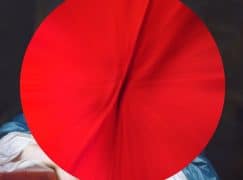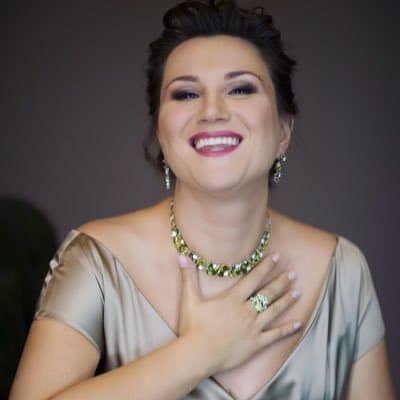Just in: Brussels creates season of Russian operas
NewsMemo from Peter de Caluwe, artistic director of the Monnaie:
Two years ago, we presented the BREX-IN season, which emphasized links with British culture. In a similar vein, are now proposing a totally unplanned-for season in which Russian titles feature more prominently than ever. We are aware that this programming might well raise questions and perhaps even trigger discussion or dismay. We have nevertheless decided to run with what was planned, or rather, what has become a cluster of Russian titles to be performed in one and the same season as a result of the COVID pandemic preventing us from performing them according to the original schedule. So while the cluster was not intentional, it provides us with an unexpected opportunity to endorse our intrinsic mission: to unite, federate and build bridges between people.
I consider our house to be an anti-war and pro-peace institution, as borne out by our position in the heart of the capital of Europe, by our purpose, our programming, our leadership style and our way of working. Our model is one of harmony, not conflict. This constitutes our moral base and there is a greater need than ever to defend it. We are therefore taking a clear stand on this matter: strong towards those who are responsible, supportive towards those who are suffering, empathic towards those who are caught in the middle.
La Monnaie strongly condemns the devastating aggression of Ukraine by the Russian regime and expresses its solidarity with the populations who are suffering the terrible consequences of this unnecessary war: first and foremost, the Ukrainian people and Ukraine’s artists. It is our responsibility as citizens to do everything within our power to help bring about a peaceful future based on the humanist values at the core of our European societies.
We also express our support for those artists who are committed to peace and who oppose, each in their own way and with great courage, this unacceptable aggression. We subscribe to the statement of Opera Europa and its members in that we “believe that there are many artists and institutions within Russia that are experiencing profound concern, disapproval and shame at what is happening, but dare not speak out for fear of savage retaliation…. We endorse the words published by Ukrainian artists and cultural activists: ‘Art has always been at the forefront of humanitarian values. We strongly believe that art cannot be subservient to political propaganda; instead it should be utilized to develop critical thinking and promote dialogue.’”
Though we cannot emphasize enough that we do not understand the motivations of the aggressors, we do believe that Russian culture is part of our shared heritage. European arts, literature, cinema and music will always be connected to Russian culture, which has inspired some of the most eloquent works on our shared continent. We cannot erase history. Indeed, great and immortal artworks confront us with ourselves>bring us face to face with ourselves? and with our own time. With our mistakes, too, and how to avoid them. It is clear to us, therefore, that the Russian repertoire should not be banned and that we must continue to perform it.
So the current conflict has not tempted us to make changes to our programming. Especially as the two composers, whose operatic and symphonic work is at the core of our season, have been victims of previous Russian regimes. We cannot contemplate punishing them again for their opinions, which defended the same values we are trying to protect now.






Since this press release oddly omits the names of the actual composers and operas, they appear to be Tchaikovsky (“Pikovaya Dama” and “Yevgeny Onegin”) and Shostakovich (“Nos”).
The fact that they need to explain themselves for doing it is so boring! But it also takes a lot of courage at the moment to escape the brainwashing propaganda coming from either side of the battlefield.
Worth noting: There are no “both sides” to Russia’s invasion or the misinformation tactics swirling around this conflict. One side is right, the other not.
Courage?
Or is it just a public relation decision, or even a marketing decision? All people across europe who cannot live without russian composers or are willing to make a certain statement will go there? Tickets will sell well?
Good for them.
I fear too many NPCs will intentionally avoid it though.
This constant virtue signalling is getting slightly nauseating. If they want to programme Russian titles, do so without writing five pages of manipulative justification. The reason they stick with the “totally unplanned-for season” that was nevertheless planned, is that they probably don’t have the funds to change it. Money is always reason number one; they might spare us the building of bridges between people rhetoric. The reason they stick with the Russian titles is that they don’t want to drop them. If we are talking figures, the popular international opera repertoire consists of about 50-60 titles, only a small percentage of which are Russian works, the largest percentage being Italian titles. Opera houses rotate these titles every year, so every title gets scheduled every 2-4 seasons, depending on how many titles the opera house can afford per season. If Russian titles feature more prominently than ever in La Monnaie’s 2022 season, it is because the La Monnaie managements wants this, not because “it happened.” They have to drop titles because they can’t perform in one season the titles originally scheduled for two or three seasons, and postponed because Covid; they have decided to drop other titles but keep the Russian titles.
If Peter de Caluwe believes art cannot be subservient to political propaganda, he is more naive than it is good for him, and must have missed the lesson about WW II and the Cold War when he was in school.
The Russian works in question have nothing to do with what happens now. Nobody should be offended by them. Whatever reason is given to go on with the planning, there is nothing against it.
Who wrote anything about being offended by the _works_?
I am not even offended by the five pages _justification_ , but not being offended by it doesn’t mean I am blind to what’s going on. If something needs five pages contradictory justification, it’s a sign something is wrong. There was no need for opera houses to apologize for featuring Verdi and Wagner titles more prominently than ever in 2013. The public didn’t wonder. The public in Poland didn’t wonder either why Wagner featured more prominently than ever in their opera houses in 1940, but they didn’t wonder for very different reasons than the public in 2013. Nor did the US public wonder why Wagner featured less in their opera houses in the 1940-1941 season (_less_ , not banned, and please note the year), but would have wondered at a _surfeit_ of Wagner titles. In Brussel they are planning a _surfeit_ of Russian titles, and they know this ain’t right, hence the justification. It is the _surfeit_ that raises questions. They could have spared us the building of bridges rhetoric. Bridges to whom? It takes two sides for a bridge. What they are doing is to play Putin’s game, let him have his cake and eat it too. Cultural propaganda had always been important, for Putin, for the Soviet Union. Now La Monnaie is doing Putin’s cultural job in the West, while Putin’s army is targeting the next city in the Ukraine, and the next, and the next. Bad idea from La Monnaie, to program _more_ Russian works.
So you know what the works are already? How good to be pre-prescient.
Is it too much to ask of posters to actually _read_ the comment they are replying to before, ya know, replying? You are the second poster who desperately wants to believe my comment is about the works. It isn’t. It’s about Peter de Caluwe’s defensive apology, and Peter’s apology is about the _quantity_ of works, in case it has escaped your attention, or maybe you didn’t read it at all because, ya know, it’s so cool to have knee jerk reactions online. Doesn’t matter to what as long as you see your name printed above a comment?
To answer your question, yes I know the La Monnaie programme. La Monnaie has a home page, go figure. What an extraordinary surprise for an opera house of the 21st century to publish their current season online. You can be “pre-prescient” too. It is called “being informed” in modern parlance, but I am afraid it isn’t a popular pastime with the lazy and excitable social media crowd. If you can exert yourself sufficiently to tell google to find the La Monnaie homepage for you, you may count the Russian works, and after you count them, you will wonder even more at Peter de Caluwe’s defensiveness. If you want to comment about the works, do so in a stand alone comment, not in reply to mine, as mine isn’t about the works.
De Caluwe’s justification would not be needed if the cancel culture mood weren’t so prevalent… and if human’s weren’t so prone to blanket condemnations in general. Given human nature of the moment, however, his justification is understandable as well as eloquent.
Peter de Caluwe’s justification is about programming _more_ Russian works than they would otherwise. This is completely unrelated to cancel culture.
Re political propaganda and arts
The unnamed cultural activists are as naive as Peter de Caluwe. That is, if those cultural activists are real.
How stupid is it? These days I am feeling physically sick when I hear yet again the word “bridges” used by yet another bunch of Russia’s “useful idiots”. Are we artists so stupid? Don’t we understand that there is the time to build bridges and the time to build walls? Walls, through which the Russian propaganda won’t get through. Don’t you think that some of those people who bomb Mariupol or Kharkiv may feel inspired kmowing that Russian music is still being played in the heart of European Union? They know their music. It is not a coincidence that the Russian special squad sent to kill Zelensky was named after the famous German nationalistic composer. Just remember – it is Ukrainians who are now blowing up their own bridges around Kyiv to save the city. Take a clue. Or at least come to Poland to help the 2 mln displaced women in children who have to flee from people killing them in the name of superiority of Russia’s culture.
What a nonsensical comment.
In WW I, when the German army was busy destroying towns and attacking the cathedral of Reims, there were initiatives to forbid German music to be played in France. A group consisting of the most prominent French musicians, among which Ravel, strongly protested against this idea, claiming that the music had nothing to do with the current barbarism.
On the other side of the divide, Schoenberg was summoned to join the Austrian army, and he was proud on his exercising – foreshadowing the 12-tone system with its top-down discipline. When asked by an officer whether he was “this notorious Schoenberg”, Schoenberg replied: “Beg to report, sir, yes. Nobody wanted to be, someone had to be, so I let it be me.”
False equivalencies. No one is _banning_ Russian works in the West. La Monnaie’s program is raising questions because they have scheduled _more_ Russian works than ever. There was no need for them to program _more_ . Had they stuck to the usual percentage of Russian works, no one would have wondered. They are doing Putin’s cultural job in the West for him. I’m sure Putin is amused, more so because of all the Western woke rushing to applaud the gesture. He is a clever one. I’m sure he has studied the woke for years and knew they would help him, all they need is a little nudge in the right direction, the direction proclaiming Russian artists and works “discriminated.” To be helped in your destruction plans by the “other” side – oh the satisfaction.
I don’t totally disagree with the argument, but in light of the unimaginable past few weeks and an untold future for Ukraine and the world, it is more than a little tone-deaf. Art is not exempt from reality. Optics matter.
Art is a fruit from reality and not its prisoner.
That would look good on a gravestone. Or a fortune cookie.
Assuming anybody’s actually interested in what’s going to be performed, as opposed to political grandstanding, the link is here.
https://www.lamonnaiedemunt.be/en/season/1199
Personally I quite like the look of Henry VIII by Saint-Saens. Who knew?
Two of five operas — big deal. A Russian-sounding recitalist.
In a very attractive season, nothing to make such a fuss about. I wonder if someone has been giving them stick over this programme, and that is why they are being so defensive and pious?
why?
“We are aware that this programming will cause heartache in Ukrainians all over the world. Because it would be considered as our support for Russia while Ukrainian civilians are slaughtered by the russians. But there is no bad publicity, right?”
“We are anti-war and support Ukraine, but don’t care about feelings of Ukrainians whom we are hurting by our stance. They are resilient enough. And, there is no bad publicity, right?”
How about a season of Ukrainian opera instead? They do exist, you know…
That is so wrong attitude 🙁 Connected to business and not wanting to change plans, but not with any higher idea or “taking care” of our “common” cultural…
This is going to go well…
Very good
Let the libtard,woke,virtue-signaling tears flow.
You missed the point? The announcement is virtue-signalling, and the woke will rejoice.
“European arts, literature, cinema and music will always be connected to Russian culture”
Until 1825 there was no national Russian culture to speak of. Russian national culture began in earnest after 1850. This constant hand-wringing that Western culture can’t survive without the few Russian popular works that have entered the international repertoire is not only ridiculous, but patently wrong. For centuries, the Western world went on creating works of art regardless of what was going on in Russia. There wasn’t much going on there, which explains the West’s indiference, and Russia’s great interest in and imitation of the Western world. The two worlds can do without each other for decades, see the Cold War, but Russian artists apparently can’t do without Western money.
When you never heard of Andrei Rublev
When you are grasping at straws. One guy does not make _national_ culture, particularly when he is painting icons in the prevailing Byzantine mannerism of the very early 15th century. Plenty of Byzantine icon painters in the 6th-15th centuries, all over South and Eastern Europe. Major hint: The style is called Byzantine, not Russian. Rublev was an imitator, jumping on the bandwagon of the centuries old Byzantine painting tradition, _not_ the creator of a new style. The next major period in arts featuring a new aesthetic originated in Italy (Renaissance), as did the next one (Baroque), followed by Western Neoclassicism. None of these art movements originated in Russia, though Russia jumped on the bandwagon every time, particularly the last two. Russia’s interest in, and imitation of, the 18-19th century Western world is apparent in all arts from architecture to painting to lit to music to dance. The Western world’s interest in Russian arts in the same period is close to nil – in what should they be greatly interested? In copies of their own arts movements?
For shame. With all the beautiful music in the world that could be performed this is not the time to be promoting ANY element of Russian culture. Thoughtless and in some way we are not being told very self-serving.
Given their taste for modernisation, they might turn A Life for the Tsar into something more up-to-date.